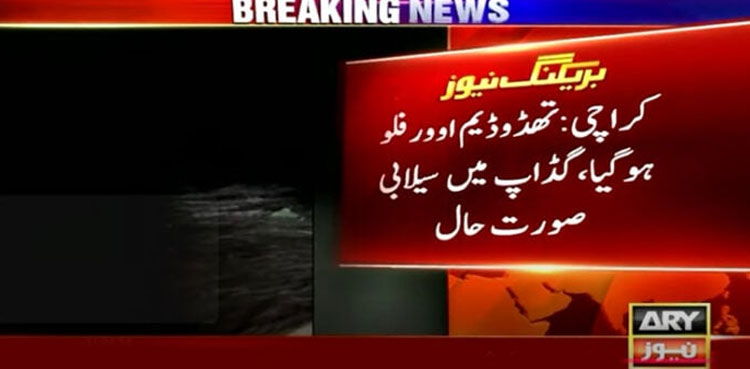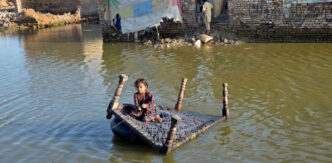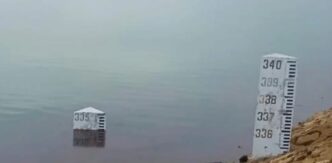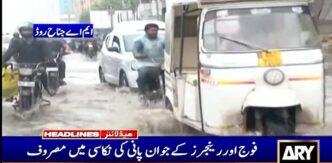Certainly! Here is a comprehensive report on the Thado Dam overflow in Karachi following heavy rainfall, based on the latest available information.
🌊 Thado Dam Overflow in Karachi: Comprehensive Crisis Report
🔍 1. Overview of the Incident
Thado Dam, located in Gadap Town, Karachi, overflowed on Wednesday, September 10, 2025, following persistent heavy monsoon rainfall in the region. The overflow triggered significant flooding, particularly affecting the M-9 Motorway (also known as the Karachi-Hyderabad Motorway) and surrounding residential areas. The situation prompted emergency declarations in multiple areas and required coordinated rescue operations involving various government agencies and military units.
📍 2. Geographical and Meteorological Context
Thado Dam is situated in the Kirthar Range region, which serves as a natural border between Sindh and Balochistan provinces. The dam overflow resulted from heavy rainfall both in Karachi itself and in the catchment areas of the Kirthar Range. This meteorological event was characterized by the Pakistan Meteorological Department as an unusual development of a deep depression during September, which had moved toward Sindh after crossing the South China Sea, Bay of Bengal, and India.
📊 3. Rainfall Measurements and Intensity
The rainfall that precipitated the dam overflow was particularly intense in several areas of Karachi:
| Location | Rainfall (mm) | Citation |
|---|---|---|
| Surjani Town | 129.6-129.8 | |
| North Karachi | 72-72.2 | |
| Korangi | 70.5-71 | |
| Defence Phase VII | 70-90 | |
| Gulshan-e-Hadeed | 69 | |
| Nazimabad | 54 | |
| Keamari | 52 | |
| Saadi Town | 51 |
The Pakistan Meteorological Department noted that this weather system would gradually move toward Balochistan and reduce into a well-marked low-pressure area.
🚨 4. Immediate Impacts and Emergency Response
🛣️ 4.1 Transportation Disruption
The overflow of Thado Dam significantly impacted the M-9 Motorway, with floodwaters reaching the highway and inundating parts of it near Jamali Bridge. This disrupted traffic between Karachi and Hyderabad, necessitating alternative routing. The Sindh government made the decision to breach the central divider of the M-9 to divert water and reduce pressure. Sindh Chief Minister Murad Ali Shah instructed officials to clear the motorway and restore traffic flow at the earliest.
🏘️ 4.2 Residential Area Flooding
The overflow caused flooding in multiple residential areas, including:
Memon Goth (where an emergency was declared)
Scheme 33
Saadi Town
Sohrab Goth
Machar Colony
Hasan Nauman Colony
Khameeso Goth
Floodwaters entered homes in these areas, trapping residents and requiring evacuation efforts.
🚑 4.3 Rescue Operations and Casualties
Tragically, the flooding resulted in several incidents:
A rickshaw and a car were swept away in Thado stream
Residents reported that a woman was washed away, while another woman and the driver remained trapped inside a submerged vehicle
Police confirmed that the Konkar stream’s water level rose sharply, hampering rescue operations
Two teenage boys died from electrocution in separate incidents in Sohrab Goth and North Karachi
A young man identified as Ali Gul Mithani drowned in the Malir River
Rescue operations involved multiple agencies:
Rescue 1122 teams worked alongside district administration
Pakistan Army personnel were mobilized for civilian rescue operations
Pakistan Rangers Sindh and other law enforcement agencies assisted
Over 350 citizens were relocated to safer areas through coordinated efforts
🏛️ 5. Government Response and Leadership
📋 5.1 Provincial Government Actions
Sindh Chief Minister Murad Ali Shah issued directives to closely monitor water flow from Thado Dam and keep the public continuously informed to prevent further harm. He visited rain-hit areas including Qayyumabad, Korangi Causeway and Shaheed Bhutto Road, stating that the situation was under control but warning citizens to remain cautious until water levels recede.
🎯 5.2 Municipal Response
Karachi Mayor Murtaza Wahab inspected affected areas and described the situation as “dangerous,” noting that such water pressure in Malir and Lyari rivers had “never been seen before”. He confirmed that the army was deployed at his request through the Chief Secretary. The mayor also reported that 318 people had been rescued and moved to safety from areas close to Lyari River, with teams still on the ground.
⚠️ 6. Broader Flood Context in Karachi
The Thado Dam overflow occurred within the context of wider flooding challenges in Karachi:
🌧️ 6.1 River System Impacts
Both the Lyari and Malir rivers overflowed due to the heavy rainfall:
The Malir River inundated Korangi Causeway, forcing authorities to shut the crossing and divert traffic
The Lyari River flooded adjoining localities and trapped families, prompting rescue operations
Figure: Mayor Wahab stated he had “never seen so much water” in the Lyari River
🏙️ 6.2 Urban Infrastructure Challenges
The rain exposed the city’s fragile drainage infrastructure:
The city’s outdated drainage systems struggled to cope, especially in low-lying areas
Traffic moved at a snail’s pace on major thoroughfares due to accumulated rainwater
University Road, already under strain due to the ongoing Red Line project, became particularly problematic
🔮 7. Future Outlook and Preparedness
The Meteorological Department indicated that the wet spell would persist with moderate rainfall for the next two days. The weather system was expected to gradually move toward Balochistan and reduce in intensity. Authorities remained on high alert for further developments, with rescue teams and military units prepared for additional emergency response.
💎 8. Key Statistics and Impact Summary
| Aspect | Impact | Citation |
|---|---|---|
| Maximum Rainfall | 129.8mm (Surjani Town) | |
| Rescued Citizens | 350+ | |
| Confirmed Fatalities | 3+ | |
| Major Roads Affected | M-9 Motorway, Korangi Causeway | |
| Residential Areas Flooded | 10+ localities | |
| Emergency Declarations | Memon Goth |
🏁 9. Conclusion
The overflow of Thado Dam on September 10, 2025, represents a significant environmental emergency for Karachi, resulting from unusually intense monsoon rainfall. The incident highlights the vulnerability of urban infrastructure to extreme weather events and the importance of coordinated emergency response. While government agencies and military units responded promptly with rescue operations and infrastructure interventions, the event resulted in property damage, transportation disruptions, and tragic loss of life.







